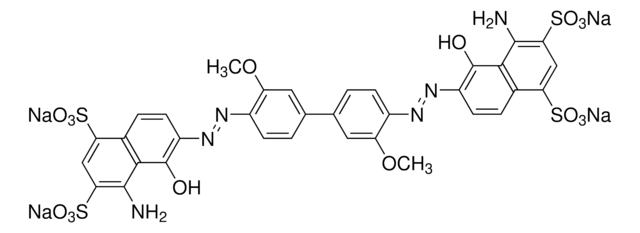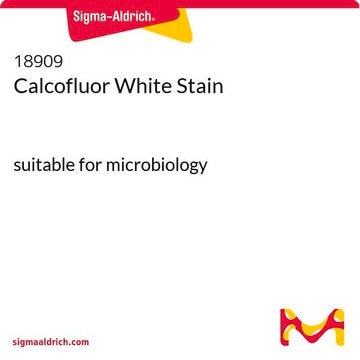C1144
Chlorazol Black
Powder
Synonym(s):
4-Amino-3-[[4′-[(2,4-diaminophenyl)azo][1,1′-biphenyl]-4-yl]azo]-5-hydroxy-6-(phenylazo)-2,7-naphthalenedisulfonic acid disodium salt, Chlorazole Black E, Direct Black 38
About This Item
Recommended Products
product name
Chlorazol Black,
form
powder
Quality Level
composition
Dye content, ≥45% (based on Nitrogen)
color
dark brown to black
solubility
H2O: 1 mg/mL
application(s)
diagnostic assay manufacturing
hematology
histology
storage temp.
room temp
SMILES string
[Na+].[Na+].Nc1ccc(\N=N\c2ccc(cc2)-c3ccc(cc3)\N=N\c4c(N)c5c(O)c(\N=N\c6ccccc6)c(cc5cc4S([O-])(=O)=O)S([O-])(=O)=O)c(N)c1
InChI
1S/C34H27N9O7S2.2Na/c35-22-10-15-27(26(36)18-22)41-38-24-11-6-19(7-12-24)20-8-13-25(14-9-20)40-42-32-28(51(45,46)47)16-21-17-29(52(48,49)50)33(34(44)30(21)31(32)37)43-39-23-4-2-1-3-5-23;;/h1-18,44H,35-37H2,(H,45,46,47)(H,48,49,50);;/q;2*+1/p-2/b41-38+,42-40+,43-39+;;
InChI key
XRPLBRIHZGVJIC-UVHCWRHYSA-L
Looking for similar products? Visit Product Comparison Guide
General description
Application
Signal Word
Danger
Hazard Statements
Precautionary Statements
Hazard Classifications
Carc. 1B - Eye Irrit. 2 - Repr. 2
Storage Class Code
6.1C - Combustible acute toxic Cat.3 / toxic compounds or compounds which causing chronic effects
WGK
WGK 3
Flash Point(F)
Not applicable
Flash Point(C)
Not applicable
Personal Protective Equipment
Choose from one of the most recent versions:
Already Own This Product?
Find documentation for the products that you have recently purchased in the Document Library.
Customers Also Viewed
Our team of scientists has experience in all areas of research including Life Science, Material Science, Chemical Synthesis, Chromatography, Analytical and many others.
Contact Technical Service













